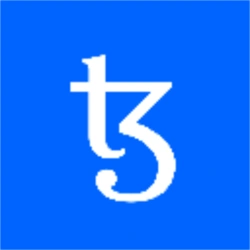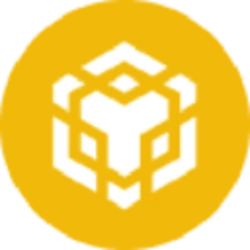 Tezos
Tezos 0.16%0.0006(24h)
0.16%0.0006(24h)1H

7D

30D

60D

90D

Low:-
High:-
1H

7D

30D

60D

90D



Live Token Dashboard & Analytics
Track this token’s real-time pricing, market indicators, supply metrics, exchange activity, and technical analysis insights. The dashboard presents accurate market dynamics to help evaluate performance. If the data is inaccurate, Report to us



 0x1693...12623a
0x1693...12623a Market Cap
Market Cap

N/A
N/A
N/A
N/A
The live price of Tezos is at 0.3860 with 24 hours volume of 16,271,505.05. The chart above shows is currently by -0.17% in the past hour and 0.16% by since yesterday. The total circulating supply of Tezos token is 1,075,988,644.91
Over the last 24 hours, Tezos token experienced trading activity amounting to 16,271,505.05. The decentralized exchange (DEX) volume accounted for 0.020, while centralized exchanges (CEX) stood at 16,271,505.05.
Tezos (XTZ) token reached an all-time high of 9.18 on and an all-time low of 0.3146 on .
Dropping -95.79% from its ATH is a significant retracement, yet a rise of 22.68% from its ATL projects robust recovery.

Sell
Neutral
Buy

Sell
Neutral
Buy

Sell
Neutral
Buy



Please wait data is Loading...
Pairs | Trust Score | |||
|---|---|---|---|---|
Tezos is a Layer-1 blockchain protocol operating with the Liquid-Proof-of-Stake (LPoS) consensus mechanism. The platform's developers have designed it as open source and focus on minimal power consumption and energy efficiency. The Tezos coin, XTZ, drives the ecosystem, which supports a variety of assets and decentralized applications (dApps).
Key Features:
Self-Amending Governance: On-chain governance allows stakeholders to propose and vote on upgrades, thereby avoiding hard forks and ensuring smooth innovation.
Formal verification: ensures that smart contracts are safe and bug-free for DeFi and enterprise applications.
Scalability & Composability: Tezos 2.0 rolls out Layer 2 scaling and supports the most-used programming languages to increase developer access.
Decentralized Participation: LPoS allows stakeholders to secure the network via baking or delegation while still earning rewards while maintaining decentralization.
Tezos Use Cases
Web3 and dApps:
The arrival of Web3 is enabled by decentralized applications (dApps) in an intermediary-free space governed by their users, thanks to Tezos. With its governance self-amending, it makes the perfect candidate for a decentralized evolution internet.
Defi:
With the formal verification of smart contracts, Tezos is a perfect security and scalability platform for all decentralized financial applications such as lending, borrowing, and trading, making it very reliable for a strong financial service.
Gaming:
Tezos serves the ability to power games that run purely on the blockchain and allows players to own digital game assets as NFTs. It is an ideal platform for developing decentralized gaming ecosystems due to its scalability and energy efficiency.
Tezos NFTs:
Tezos is the premier platform for minting and trading NFTs, allowing digital artists and creators to exhibit and sell digital artworks in a safe and eco-friendly place, thanks to its smart contracts and green blockchain design.
Using formal verification mathematics to prove the correctness of smart contracts helps the Tezos network make security immunity from vulnerabilities and errors. This means using Liquid Proof-of-Stake (LPoS) consensus to enable decentralized validation of everything. It also permits modification to the perfected protocol without causing shutdowns. maintaining robust security over time. Tezos, therefore, is a trusted platform for sensitive applications like DeFi and NFTs. There are two main components Nodes and Bakers:
Nodes
The most critical aspect of the Tezos network and the complete functionality of its blockchain is being provided through Nodes: recording of the blockchain, which finds a copy in all nodes around the network. It constitutes a form of synchronization with other nodes for data sharing; thus, it has an accurate and possibly consistent point of view among all participants. The nodes are classified into three types:
Rolling nodes: Such nodes carry recent blocks with their current context.
Full nodes: These comprise the whole history of the blockchain from genesis onward and can recompute the ledger state.
Archive nodes: It retains all past historical data at any time and can enable you to revert to your previous balances and staking rights.
While many people deploy a node, the contribution to decentralization is not limited to that. By running a Node the users can keep in touch with the blockchain completely, without relying on third-party nodes.
Bakers:
Baking is an act of adding new blocks to the Tezos blockchain. Bakers validate and create blocks by staking their XTZ tokens. Baking rights are attributed to randomly selected bakers in proportion to how much XTZ a particular baker staked. New blocks are created and proposed for confirmation by the other bakers. They then receive rewards in transaction fees and newly minted XTZ.
Bakers may be penalized for behavior that is perceived as maliciousness: one example is that of double baking. This would be slashed, or part of their staked XTZ would go missing. Those who have less XTZ or lack infrastructure may delegate their tokens to a baker and still enjoy part of the rewards. Bakers are important for the security and decentralization of an entire network.
On-chain Governance in Tezos
On-chain governance is a process of proposing, discussing, and voting on protocol changes that would take place within the blockchain system itself and would not require an external decision or contentious hard fork to make it happen. The on-chain governance system of Tezos is a point of difference that the protocol shall evolve with formalized, inclusive, and transparent provisions.
Important Features of Tezos On-Chain Governance:
Self-Amendment:
Tezos is a self-amending blockchain; it automatically upgrades itself not requiring any forks.
Stakeholders vote on proposed changes, facilitating innovation while safeguarding the integrity of the network.
Decentralized Decision Making:
All token holders participate in governance either directly or through delegating their voting rights to bakers (validators).
That is how the voice of the community drives the direction of the blockchain.
Five-Period Governance Cycle:
The governance process is divided into five periods, each lasting five baking cycles (roughly 14 days):
Proposal Period: Stakeholders submit and vote on amendment proposals.
Exploration vote period: the community considers and votes to explore a selected proposal further
Cooldown period: time allocated for testing and discussing the proposal.
Promotion vote period: a final vote to determine if the proposal should be activated by the proposal.
Adoption period: time for the community to prepare itself for activating the protocol. Supermajority requirement: A proposal cannot be passed without gaining a supermajority (80%) in voting the height of stakeholder consensus.
Testing Before Activation: Dedicated test networks are created during the governance cycle in anticipation of the community finding and fixing any conceivable problems before the proposal is activated.
Smart contract execution In Tezos(XTZ) blockchain
Tezos blockchain Smart contract execution supports decentralized applications (dApps) and allows for much more complex trustless interactions between people without the interjection of third parties. Michelson is the programming language in which Tezos smart contracts are written. It was designed for formal verification so that the code's correctness and security could be ensured.
Smart contract execution in Tezos has several important features:
Formal Verification: There is a guarantee of correctness and security of code through formal verification, with a resultant lessening of errors and vulnerabilities, fit for DeFi and enterprise applications.
Michelson and High-Level Languages: Smart contracts are written in Michelson, but high-level languages such as Archetype, SmartPy, and Ligo can also be used and compiled into Michelson for execution.
Gas and Cost Efficient: The charges for smart contracts are based upon resource consumption and paid completely in native XTZ to cover transaction and computation fees.
Decentralization and Security: Tezos' decentralized network of nodes and bakers and its continuous upgrade of protocol backward compatibilities will then secure all contract executions.
Smart Contract Upgrades: The community consensus enables seamless contract upgrades, as Tezos' self-amending governance effectively eliminates the need to create hard forks.
Tezos was founded by the current CEO(2024), Arthur Breitman and Kathleen Breitman. Arthur introduced the idea in a position paper in August 2014, followed by a white paper in September 2014. Published under the pseudonym "L. M Goodman," those papers offered some criticism of Bitcoin governance and proposed an on-chain governance blockchain to avoid hard forks.
In 2015, Breitmans founded Dynamic Ledger Solutions (DLS) to develop the Tezos codebase. Tezos debuted its alphanet in February 2017, and afterward held an Initial Coin Offering (ICO) in July 2017 wherein a total of $232 million was raised. However, the project has stalled over internal conflicts between the Breitmans and Tezos Foundation president Johann Gevers. The dispute finally resolved itself early in 2018, and Tezos launched its betanet in June 2018, and mainnet in September 2018, implementing a Liquid Proof-of-Stake (LPoS) consensus model, decentralizing governance and staking.
Tezos launched its Initial Coin Offering (ICO) on July 1, 2017, and raised an unprecedented ~$232 million in Bitcoin and Ethereum within just 13 days, surpassing its $20 million target. This made it the largest ICO at the time, later exceeded by Filecoin. The ICO attracted over 30,000 contributors, distributing tokens proportionally to contributions. The funds raised were managed by the Tezos Foundation, established in Switzerland, to oversee the network's development and growth. However, internal disputes between the Breitmans and Tezos Foundation president Johann Gevers caused delays in token distribution, leading to lawsuits. The issues were resolved in early 2018, allowing development to resume.
As of 2024, the total supply of XTZ tokens is 1 billion XTZ tokens. The token reached its all-time low of $0.3505 on December 7, 2018, marking a price increase of 355.06% since then. Its all-time high was $9.12 on October 4, 2021, which represents a decline of 82.51% from that peak.
The selection of a Tezos wallet is based on the degree of security, convenience, and usage. This is a brief overview of the primary types of wallets:
Hardware Wallets
Physical wallets such as Ledger Nano S/X and Trezor Model T provide offline storage, which provides maximum security; they are very suitable if you intend to keep large amounts of the XTZ, but do require initial investment costs and are best suited to those with advanced experience using them.
Software Wallets
Software wallets are free and user-friendly. Some of the software wallets are Temple Wallet, Galleon, or Kukai. They are either custodial or non-custodial. For these reasons, they are most excellent for a small amount of holding XTZ or for a beginner. However, they don't hold as much security as hardware wallets.
Web Wallets
Merely web wallets like Kukai Web Wallet for browsing accessibility are just too fast and convenient but are seen as not secure and fit just for small amounts or frequent traders.Where to buy Tezos (XTZ)?
As of 2024, Tezos (XTZ) is listed on 40+ exchange platforms, with Binance and Coinbase being some of the primary exchanges where most of the token trading occurs.
The majority of these platforms are centralized exchanges (CEX), including Binance, Coinbase, Kraken, Huobi, and Bitfinex. Additionally, there are decentralized exchange (DEX) options such as Uniswap and Quipuswap for trading Tezos.
For US-based users, popular platforms include Coinbase, Kraken, Gemini, and Binance US, offering compliance with regulatory requirements.
Common Tezos trading pairs include XTZ/USDT, XTZ/USD, XTZ/BTC, XTZ/EUR, and XTZ/ETH.